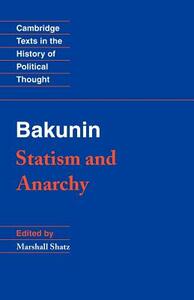Take a photo of a barcode or cover
aaravbalsu's review
4.0
Great first start to contemporary anarchist philosophy; Bakunin lucidly describes the flaws of a statist approach to proletarian liberation (a strategy endorsed by Marx, and later Lenin, who put these ideas into practice in the USSR). Plenty of historical flavor regarding European geopolitics between the 1820s to the early 1870s. This book was published just after the 1871 Franco-Prussian war, and details the Paris Commune's brutal suppression at the hands of French troops, German state centralization and militarism, etc. Overall, it's a fairly easy book to read, given that Bakunin peppers in some humor every now and then. Broadly speaking, the book is divided into an explanation of the role of bourgeoisie in propping up a state, a brief history of Slavic demographics and their destitution, the progression of German continental supremacy, the failure of German socialists to truly achieve worker liberation, and an analysis of the particularly Prussian strain of aristocratic-militarism. Absolute must for anyone seeking to understand the argument of a non-statist, collectivist approach to economic emancipation.
Cons: This book is laced with Germanophobia and has some anti-Semitism sprinkled in for good measure. I wish the book delved more into the practical implementation of worker collectives, rather than just focusing on the theory of why they're supposed to be good.
Cons: This book is laced with Germanophobia and has some anti-Semitism sprinkled in for good measure. I wish the book delved more into the practical implementation of worker collectives, rather than just focusing on the theory of why they're supposed to be good.
kev_nickells's review
3.0
In some senses, very much a product of its time. His is often a highly racialised perspective which means anti-semitism and a very deterministic view of people's character. It's fascinating as a historical document, detailing the fractures in the international and pre-empting plenty of problems of (what became) Marxism. When he's good, he's great - foreseeing the problems of (eg) bourgeois assimilation into statism, the fallacy of a political class within states that might represent the proletariat. It's not an academic book, in many senses - there's plenty of decrying of German statism at a time when the notion of the pan-Germanic was on the rise but the counterpart to that of Bakunin's own Russia is somewhat flimsy. A lot of the political detail in this books takes place in West Europe, but (eg) the terrors of the British empire are given fairly short shrift next to his disdain for Bismarck.
Not a terrible book by any means, and not one I regret reading. For when he does talk about anarchism it's engaging and exciting - he qualifies the necessity of anarchist 'theory' as contrary to the kind of economic scientistic thinking of Marx / Engels - that is, rarely are people convinced by abstractions and theory. Rather the problem of 'theorising' Bakunin's anarchism is precisely that it resists the doctrinaire - it's more framework than dogma - so the content of Bakunin's anarchism seems to reside in a federalised free association.
I don't know what I'd recommend as a book on the subject of state and anarchism, but it's probably not this. Unless you're quite specifically into books of this style and from this time.
Not a terrible book by any means, and not one I regret reading. For when he does talk about anarchism it's engaging and exciting - he qualifies the necessity of anarchist 'theory' as contrary to the kind of economic scientistic thinking of Marx / Engels - that is, rarely are people convinced by abstractions and theory. Rather the problem of 'theorising' Bakunin's anarchism is precisely that it resists the doctrinaire - it's more framework than dogma - so the content of Bakunin's anarchism seems to reside in a federalised free association.
I don't know what I'd recommend as a book on the subject of state and anarchism, but it's probably not this. Unless you're quite specifically into books of this style and from this time.
nb_leftist's review
challenging
hopeful
informative
reflective
slow-paced
3.75
I think it’d be better w/o the rampant antisemitism, I think this is also more of a later read. It’s hard to understand w all the historical references and it’s not till the latter chapters where it starts to actually talk about anarchism directly. Very hard to understand if you aren’t experienced in reading through theory like this.
Graphic: Antisemitism
dozydom's review
slow-paced
3.5
Interesting and informative mostly as a historical artifact of 19th century anarchism; bakunin's insight into communism and Marxism is more helpful than his extensive musings on the racial and national characteristics of Germans and Jews.
macho's review
4.0
This is so focused on nineteenth century European geopolitics, and especially the road to the unification of Germany, that I wouldn't have been able to get through this or understand what Bakunin was talking about if I didn't happen to have been reading a lot about both topics a lot over the past year. Bakunin's political philosophy (which is obviously what I was reading this for) is told a bit indirectly through that story: I was expecting it to be more in the forefront. He does critique Marx, and I quickly read Marx's reply to Bakunin in his "Conspectus" immediately afterward. It's hard for me to reconcile giving a good review to a book that occasionally exihibits base anti-Semitism, which it goes without saying is ugly and inexcusable.
cinaedussinister's review
3.0
Relatively vanilla conclusions for a Socialist Anarchist, and quite a rationalistic method, but definitely not the worst.
